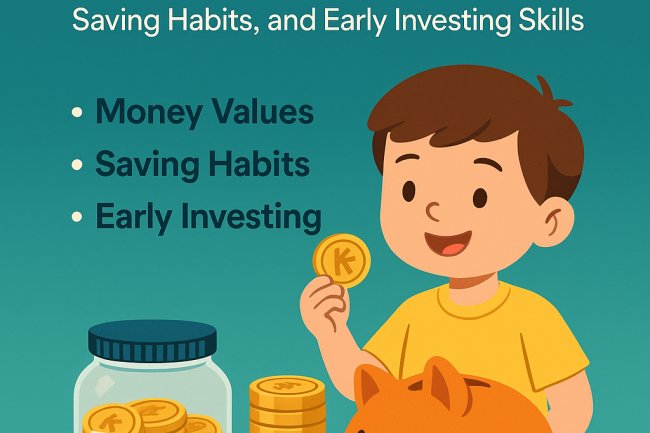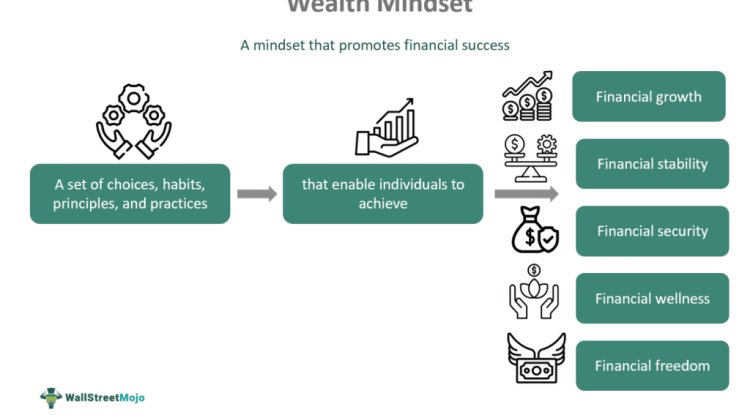7 Things You Should Avoid If You Want to Be Rich: Key Lessons for Financial Success
Discover the 7 biggest mistakes that stop people from building wealth — from lifestyle inflation to avoiding risk. Learn how to sidestep these traps, grow your income, and secure financial freedom in Kenya and beyond.

Everyone wants to achieve financial freedom, but not everyone understands the hidden traps that can derail the journey to wealth. In a popular YouTube video, self-made millionaire Mark Tilbury – who left school at 16 with no qualifications and no money and now runs a multi-million dollar business – shares seven critical pitfalls that hold people back from becoming rich. Tilbury’s core message is that avoiding these common mistakes is just as important as adopting positive habits on the path to prosperity. In this post, we summarize the video’s key takeaways and provide additional insights, with examples relevant to Kenya and Africa, to help you build wealth and empowerment.
1. Working Just for Money (Ignoring Skill and Equity Growth)
One of the biggest mistakes is working solely for an immediate paycheck without considering long-term growth. Tilbury explains that chasing a high-paying job or gig might fill your bank account now, but if it doesn’t help you develop valuable skills or ownership (equity), your earning potential will eventually hit a ceiling. In other words, a job that pays more today could leave you stuck tomorrow if it offers no learning or growth opportunities. Successful millionaires often choose paths that might pay less in the short term but build expertise and assets for the future. They focus on gaining high-income skills (like digital marketing, software development, or business management) and creating value, knowing the bigger rewards will follow.
Focus on growth, not just immediate cash. In the Kenyan and African context, this lesson is crucial. Many young people are tempted by quick money schemes – for example, the sports betting craze that promises instant winnings. However, these often lead to financial hardship rather than wealth. Betting firms “sell the illusion of instant wealth while deepening financial struggles,” preying on those chasing quick cash. Instead of spending all your time on something that just pays the bills today (or gambling in hopes of a windfall), invest time in yourself. Learn a trade, improve your education, or start a side hustle that can grow. Developing marketable skills or a business may not make you rich overnight, but it builds a foundation for sustainable wealth. The bottom line: don’t work just for money – work to build value and skills, and the money will come as a result.
2. Living Above Your Means (Lifestyle Inflation and Premature Luxury)
Another wealth killer is lifestyle inflation – spending more as soon as you earn more, often to project a luxurious image. Tilbury warns that in the age of social media, many people equate “displaying wealth” with “having wealth,” which is a dangerous illusion. Buying expensive cars, gadgets, or designer clothes to “feel rich” can actually prevent you from becoming rich. True millionaires, he notes, often live modestly and invest in assets rather than liabilities – they prioritize investments over impressions. In short, if you increase your expenses every time your income rises, you’ll never get ahead financially.
This message hits home in Kenya, where the “soft life” trend has grown. Social media is flooded with images of young people enjoying high-end lifestyles – fancy phones, trendy outfits, nights out at pricey lounges – sometimes far beyond their pay grade. The pressure to keep up can lead to debt and zero savings. For instance, a Kenyan personal finance coach observed that “a young graduate who once comfortably lived on KSh 25,000 now finds it impossible to manage even with a salary of KSh 60,000” due to lifestyle inflation. Many young Kenyans even turn to easy credit and mobile loans to fund weekend outings or the latest smartphone, creating a cycle of dependency and stress “far from the soft life they sought”. Remember, living above your means is a trap. The flashy lifestyle might impress on Instagram, but it doesn’t build wealth – in fact, “the illusion of wealth today robs many of real wealth tomorrow”. To be truly rich, live below your means, avoid unnecessary debt, and channel your extra income into savings, investments, or business opportunities that will grow your net worth.
3. Doing Everything Alone (The Solo Journey Myth)
The idea of the lone-wolf “self-made” millionaire is largely a myth. Tilbury emphasizes that trying to do everything by yourself is a mistake because “success rarely comes to lone wolves”. Behind every wealthy individual, there are often mentors, partners, or teams. Building wealth is a team sport: you need advisors, peers, or employees to collaborate with. Instead of being afraid to ask for help or split the pie, realize that strategic partnerships and networks can massively accelerate your success. By leveraging other people’s expertise, time, or resources, you can achieve far more than you would alone. In practical terms, this could mean finding a mentor in your industry, partnering with someone who has complementary skills, or simply learning from successful people around you.
This lesson resonates strongly in African cultures that value community. There’s a famous proverb: “If you want to go fast, go alone. If you want to go far, go together.” In Kenya, for example, many people use chamas (informal savings and investment groups) to achieve financial goals collectively. In fact, a 2016 study found that 41% of Kenyan adults use informal financial groups like chamas, while only 32% have traditional bank accounts. These groups allow individuals to pool money, invest as a unit, and support each other – a testament to the power of collaboration. Whether it’s joining a chama, finding business co-founders, or simply seeking advice from a seasoned entrepreneur, don’t isolate yourself on your wealth-building journey. Networking, community support, and mentorship can open doors to opportunities and help you avoid costly mistakes. Remember, you’re not the first person trying to get rich – learn from others and grow together.
4. Information Overload (Paralysis by Analysis)
We live in the information age, and paradoxically, that can make building wealth harder. Tilbury points out that aspiring wealth-builders today face information overload – there’s an endless stream of financial advice, YouTube videos, online courses, investment tips, and get-rich-quick schemes bombarding us daily. Consuming too much conflicting information can lead to paralysis by analysis. You might jump from one idea to the next, constantly research but never take action, or feel so overwhelmed that you stick with none. Tilbury’s advice is to filter and focus: zero in on a few proven strategies aligned with your goals and tune out the rest. In practice, this means if you decide, say, to build a rental property portfolio or start an online business, you should primarily study and act on those areas and not get distracted by every new stock tip or crypto craze that comes along.
In Kenya and across Africa, the rise of the internet and social media has brought not only useful knowledge but also scams and noise. It’s all too easy to find yourself hopping from an “invest in Forex” seminar to a multi-level marketing pitch to a cryptocurrency Telegram group – only to end up confused and possibly conned. A cautionary tale is the pyramid scheme epidemic that hit Kenya in the 2000s: over 40,000 Kenyans lost around KSh 8 billion total in dubious “investment” schemes by chasing outrageous promises of high returns. This happened because people overloaded on misinformation and didn’t critically vet the opportunities. The lesson is clear: be selective about whom you listen to and what you pursue. Educate yourself, yes, but don’t try to absorb everything. Quality beats quantity when it comes to financial information. Pick a trusted mentor, a credible financial resource, or a sound strategy and commit to it. By cutting through the noise and avoiding analysis paralysis, you can actually start making progress – whether it’s finally launching that side business, or consistently setting money aside to invest each month.
5. Letting Ego Override Learning (Pride vs. Humility)
To grow wealthy, you must also grow personally – and that means checking your ego at the door. Tilbury warns that “pride often precedes financial falls”. If you become overconfident or assume you know everything, you close yourself off to new information that could save or make you money. The wealthy tend to remain lifelong learners. Tilbury notes that “true wealth builders maintain humility while pursuing excellence,” always staying teachable and open to feedback. They seek mentorship, learn from others’ experiences, and admit when they don’t know something. This willingness to learn and adapt helps them avoid costly mistakes, whereas stubbornly doing things your own way can lead to avoidable failures.
In practical terms, avoiding this pitfall means never thinking any job is “below you” when you’re starting out, or any advice is worthless just because you’re doing well at the moment. For example, if you start a small business in Nairobi and it takes off, that’s great – but don’t let success make you tune out your accountants, advisors, or customers who might point out flaws. Likewise, if you’re an expert in one field, stay humble enough to learn when you venture into a new investment area. Many people have lost money in the stock market or farming or any venture because they assumed “I’ve got this, I know better than everyone,” rather than studying and seeking counsel. Cultivate humility. In the African context, this might involve listening to elders or industry veterans who have wisdom from years of experience. It could mean reading books by successful investors or taking courses even after you’ve made some money. Remember, even the richest individuals – from Warren Buffett globally to notable African entrepreneurs – continue to read, ask questions, and learn. By keeping your ego in check, you ensure that you’re always growing, improving, and ready to seize opportunities (or avoid pitfalls) that you might have otherwise missed.
6. Playing the Blame Game (Lack of Accountability)
The blame game is a mindset that will keep you poor. This happens when someone constantly blames outside forces – the economy, the government, their family, lack of luck – for their financial situation, instead of taking responsibility. Tilbury stresses that “taking responsibility separates successful wealth builders from perpetual dreamers”. The wealthy make it a point to own their choices and learn from setbacks, whereas those who never build wealth often have a laundry list of excuses for why they can’t succeed. The truth is, while external factors (like a recession or a tough job market) do affect us, what you do about it is ultimately up to you. Blaming others or circumstances only wastes time and energy – time and energy that could be used to find solutions and adapt.
In Kenya and Africa at large, it’s easy to point to challenges: high youth unemployment, corruption, inflation, limited access to capital – the list goes on. These are real issues, but dwelling on them won’t change your bank balance. What can change your situation is adopting a problem-solver’s mindset. For example, instead of saying “No one will give me a job because the economy is bad,” you could identify a gap in your community and start a small business to fill it, or you could upgrade your skills to become invaluable. We have stories of entrepreneurs in Africa who started with nothing but an idea and perseverance, succeeding despite the harsh environment. They did so by focusing on what they could do (however small) rather than what was outside their control. Hold yourself accountable for your financial future. If you make a money mistake, don’t dwell on whose fault it was – analyze what you could have done better and resolve to learn from it. This proactive attitude is empowering: when you realize that you have the power to improve your finances through your decisions, you no longer wait for perfect conditions or blame imperfect ones. You just get to work, which is exactly what successful people do.
7. Staying in Your Comfort Zone (Avoiding Growth and Risk)
The final pitfall is perhaps the most common: comfort zone stagnation. This is when you stick to what is safe and familiar, avoiding any kind of risk or discomfort, and as a result, you stop growing. Tilbury notes that “financial growth demands continuous evolution”. To become rich, you must stretch beyond your comfort zone – whether that means learning a new skill, starting a project, meeting new people, or investing in something new. Those who remain in the same old routine, afraid to try anything different, will likely see their finances plateau. On the other hand, those who embrace calculated risks and seek out new opportunities tend to innovate and find additional ways to build wealth. In simple terms: if nothing changes, nothing changes. You can’t grow your income or investments by doing exactly what you’ve always done and never more.
How does this apply in real life? It means if you’ve been saving money in a basic account, maybe it’s time to step up to researching mutual funds or SACCOs. If you’ve been meaning to start a side business but haven’t, it’s time to register that business name and get moving. It might even be as basic as networking beyond your usual circle – say, attending a workshop or seminar in Nairobi to meet like-minded aspiring investors, even if you feel shy. Studies have shown that a lot of people regret playing it too safe. In the UK, for example, over half of adults never venture outside their comfort zones, and 45% fear they’ll one day regret not doing more. Don’t let that be you. Of course, stepping out doesn’t mean being reckless – it means taking smart, “calculated” risks as Tilbury says. Kenya’s own economic success stories (from the spread of mobile money to the rise of tech startups) came from individuals and organizations willing to try new ideas in a place no one thought they’d work. So, whether it’s starting that poultry farm you’ve dreamed of, going back to school for that degree, or pitching your startup to an investor, take that step. Even if it’s uncomfortable at first, that’s how you break into new levels of success.
Conclusion: Take Charge of Your Wealth Journey
Achieving wealth isn’t about luck or secret tricks – it’s about consistently doing the right things and, as Mark Tilbury reminds us, avoiding the wrong things that sabotage progress. From his journey of starting with nothing to building a fortune, Tilbury learned that sidestepping these seven pitfalls is crucial to reach financial freedom. The same applies to you. The good news is that every one of these mistakes can be fixed with a mindset shift and deliberate action. If you’ve recognized yourself in any of these scenarios – maybe you’ve been living paycheck to paycheck, or splurging to impress others, or hesitating to invest in yourself – today is the day to change that.
Commit to making better choices starting now. Begin by identifying one or two of the above areas to work on. For example, you might decide to create a budget and cut unnecessary spending (avoiding lifestyle inflation), or finally enroll in that course to boost your skills (investing in growth instead of staying comfortable). Over time, these adjustments will snowball into significant improvements in your finances. Remember, building wealth is a journey of many steps and learning moments. Stay humble, stay focused, and stay proactive.
At Global Wealth Insights, we are passionate about helping Kenyans and Africans achieve financial literacy and empowerment. Use these insights as a roadmap to avoid mistakes on your path to prosperity. We encourage you to put this knowledge into practice – and to keep learning. Your wealth journey is in your hands. Start by avoiding these pitfalls, and you’ll be much closer to your goal of being rich and financially free. Now is the moment to act: make that investment, start that business, or simply change a habit – and step confidently toward the wealthy future you deserve.
Ready to transform your financial future? Don’t just read and forget – take action. Share this knowledge with a friend, set new goals for yourself, and continue following Global Wealth Insights for more tips on wealth building, finance, and empowerment. Your journey to wealth and freedom begins with the choices you make today. Make them count!
What's Your Reaction?




















